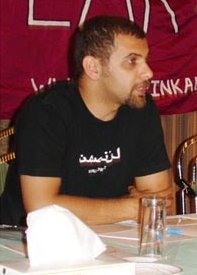Raed Jarrar is an Iraqi who lives in the United States and was waiting for his airplane flight home from Washington DC to California. He was approached by three law enforcement officers and an employee of JetBlue (the airline he was using) and asked to remove a t-shirt he was wearing.
The shirt said “We will not be silent” in Arabic:

He protested because he didn’t have another shirt to wear (it was in his checked baggage) and he felt it was his Constitutional right to wear a t-shirt with a slogan– even one in Arabic. The agents were unimpressed, refusing even to believe that’s what it said. The English translation is immediately below the Arabic script, but they argued that it could just as well say something threatening. They admitted they didn’t read Arabic, nor did they have a translator handy, so they simply assumed it was some dark, malicious saying.
Jarrar agreed to wear his shirt inside-out if they could prove to him that there’s a law prohibiting the wearing of shirts with Arabic sayings. Of course there is no such law, but the men persisted and eventually Jarrar agreed to wear a shirt that said “New York” from a nearby kiosk.
Adding this incident to other recent ones– like the man who was removed from a plane last week for saying an Islamic prayer, or the two Middle-Eastern men who were refused entrance to a plane because they “looked threatening”– and a very ugly picture is being drawn. People of Middle Eastern descent are being singled out and unfairly identified with terrorism.
Personally, I’m going to buy a shirt with Arabic on it.
